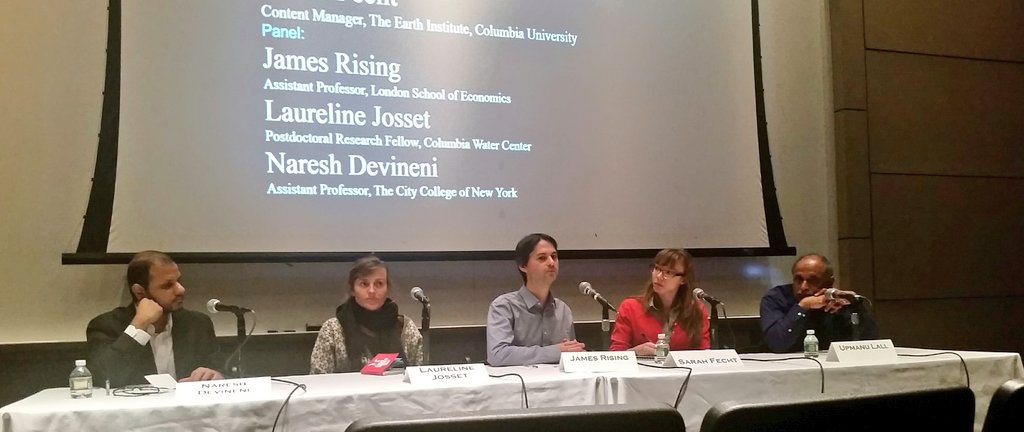Dr. Naresh Devineni is an Associate Professor at the Grove School of Engineering in the Department of Civil Engineering which he joined in Fall 2013. He operates the Risky Waters Lab where he investigates interactions of Climate and Water.
Research Interest
Devineni is focused on modeling of water systems and developing integrated risk hedging methods using multi-scale climate information. His research team works on a domain of issues related to water resources and hydrology that require rigorous systems-based inquiry and involve methodical quantification of uncertainties. Large-scale dynamics of hydroclimatology and their relations to oceanic, atmospheric, and land surface conditions and how they map to global and regional water sustainability form the crux of his research. Currently, he is running three initiatives in his Risky Waters Lab – Water Sustainability, Hydrometeorological Extremes and Dynamic Risk Management.
 |
|
Naresh participating on a panel on America's Water discussing solutions to strengthen water infrastructure and the future of sustainable water. |
Grants
Devineni was recently awarded the 2017 Early CAREER Research Program award from the U.S. Department of Energy (DOE) to study extreme events across the United States. The DOE Office of Science, Biological and Environmental Research is supporting Devineni’s work as part of the Regional and Global Climate Modeling (RGCM) program.
He is the first City University of New York faculty member to receive an Early Career Award from DOE.
His research initiatives have been supported by grants from Department of Energy’s Office of Science (DOE), National Science Foundation (NSF), National Oceanic and Atmospheric Administration (NOAA), Microsoft’s AI for Earth program, University Transportation Research Center (UTRC), CUNY Research Foundation (RFCUNY) and Oakridge Associated Universities (ORAU).
Pastime
Devineni is the creator of a data science blog where people of all backgrounds and ages can learn data analysis, probability, and statistics in a fun and intuitive way without the technical lingo. The blog has worldwide readership with more than 200,000 pageviews at an average of 1300 pageviews per week.
Teaching
Devineni teaches four courses, Civil Engineering Data Analysis, Civil Engineering Decision and Systems Analysis, Water Resources Systems Analysis and Advanced Data Analysis in the Civil Engineering department. He also conducts summer boot camps on statistics and water management for high school students as part of the CREST’s High School program.
 |
| Naresh conducting a high school boot camp on data analysis. |
Students’ Success
Devineni’s PhD students are now successfully placed in industries, agencies and academia. Elius Etienne is an applied research scientist and a water resources engineer at Gedeon GRC Consulting. Arun Ravindranath is a postdoctoral research associate at New York City Department of Environmental Protection (NYCDEP). Nasser Najibi is a postdoctoral research associate at Cornell University. Devineni is currently mentoring three other PhD students.
Devineni also mentors undergraduate students in research. Most recently, one of his undergraduate students Viktorija Molodecka won a $10,000 Eisenhower fellowship to analyze bridge reliability under the effect of increasing scour due to climate change.
Recent News
Devineni was recently selected to serve as a member of the US CLIVAR Panel on Predictability, Predictions, and Applications Interface (PPAI). The PPAI Panel’s mission is to foster improved practices in the provision, validation and uses of climate information and forecasts through coordinated participation within the US and international climate science and applications communities. The Panel is comprised of up to 12 experts from the scientific community, each serving a 4-year term.Devineni’s recent research work is published in Nature and was accorded the Editor’s Highlights.
 |
| Naresh's paper in the NatureResearchJournal |
Future Plans
Devineni is planning to establish a research center for studying global water risk and developing innovative climate-informed prognostic tools to better manage water resources.
Last Updated: 03/02/2020 12:14